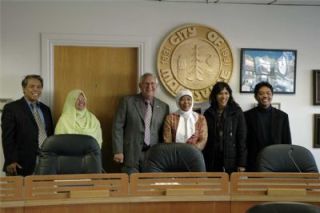MARYSVILLE They even got to spend a little time at Disney World.
It must be seen, said Indonesian Muslim school teacher Akmad Risqon Khamami.
Khamami was one of four Indonesian educators to visit Marysville Feb. 28, their second last stop on a nearly three-week tour of the United States. They spent the following day in Seattle before beginning what was described as a 24-hour-plus trek home, including stops at several airports.
By way of a simple explanation of their trip, instructor Hanun Asrohah said the delegation came to learn about culture and educational opportunities.
At Marysville-Pilchuck High School, the delegation also learned about fire drills. During a meeting with district leadership, someone set off a fire alarm that sent the delegation and about 3,000 students and teachers into the schools football field.
That was a little different, said interpreter Irawan Nugroho.
It was one of those things that just happened, said Marysville-Pilchuck instructor Ryan Hauck, who arranged for the delegations visit to Marysville through the Seattle World Affairs Council. Regarding the fire drill, Hauck added the visitors werent exactly sure what to make of the situation.
They didnt seem too worried about it, he said. They were taking pictures along the way.
The fire drill did cut short the time the delegation had to spend with local school leaders, but they spent a good bit of time with Marysville students in high schools Pathways of Choice small learning community.
Hauck said the visitors had a lot of misconceptions about the U.S., somewhat judging the country from what they have seen in Hollywood movies. They didnt quite understand why schools have mascots and some apparently werent sure what a Tomahawk is. What might be described as a more practical worry revolved around religion.
Indonesia has the largest Muslim population in the world. Hauck said the Indonesian group feared many Americans would view them as little more then terrorists. Wearing traditional Muslim garments, two of the three female visitors especially were worried about what type of reception they might receive.
They expressed an appreciation for the way in which they were treated, Hauck said.
In both their visits at the school and later with city officials, the Indonesian delegation had a lot of questions about the Tulalip Tribes and their relationship with the surrounding community. That was especially the case for Saur Marlina Manurung. Technically speaking, Saur Marlina Manurung has some 2,600 students.
Manurung is executive director of The Jungle School, or the Community of Alternative Education for Indigenous Forest People. Essentially, Manurung travels through the forests and jungles of Indonesia dealing with various tribal peoples. She has a staff of about 26 teachers.
The biggest challenge she said is making sure the locals dont take offense at anything brought before the children. Manurung said native leaders can feel very threatened by outside influences. There is one location where she cant teach women.
It takes time, but its been eight years and that taboo is still there, Manurung said.
Khamami teaches in a Muslim boarding school and there are limitations on what he can teach as well. For example, he cant talk about anything that might be interpreted as inspiring separatist beliefs, that is local separation from the rest of the country. At the same time, he must teach local history.
Khamami said his school is private, paid for by the parents of his students. At the same time, they have taken in some 300 orphans.
Nugroho said the delegations visit started in Washington D.C. and included several cities such as Austin, Texas. The trip was arranged by the U.S. State Department, with the participants chosen by the Indonesian government based on their qualifications and reasons for wanting to visit the U.S.
Indonesian teachers meet with school, city officials
MARYSVILLE They even got to spend a little time at Disney World.



